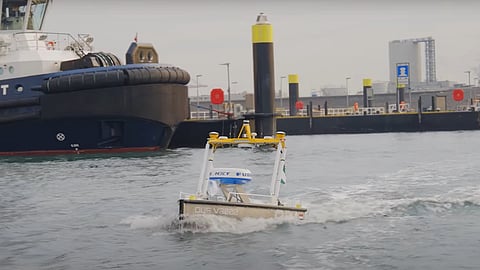

The Prinses Margriethaven area in the Port of Rotterdam was the setting for a trial with an unmanned surface vessel (USV) designed to conduct seabed surveys.
For the first time, an unmanned vessel was allowed to navigate Dutch waters beyond a closed test environment, the Port of Rotterdam Authority said in a press release.
The Inland Navigation Police Regulations (Binnenvaartpolitiereglement; BPR) normally require vessels to be crewed at all times. Since a change in the law in April 2025, it has become possible to obtain an exemption under certain conditions.
Harbour Master René de Vries granted the exemption for this trial.
Such a BPR exemption has never before been granted in the Netherlands. This allowed the USV from Demcon Unmanned Systems to sail autonomously in the Prinses Margriethaven under the supervision of a traditional crewed surface vessel from the Port of Rotterdam Authority.
A surface vessel measures the depth of harbours, rivers, canals, and locks. The use of a USV offers the Port of Rotterdam Authority opportunities for even more efficient surveying in the future, for example, for depth measurements in larger areas such as the port's Maasvlakte Two expansion.
The trial took place as part of the Port of Rotterdam Authority's fleet renewal.
Over the next 12 years, the Port of Rotterdam Authority’s vessels will reach the end of their technical service life. It is therefore using this opportunity to renew its entire fleet as well as standardise and simplify maintenance processes.
"During the fleet renewal process, we are exploring various options that will help us even better fulfil our tasks in the Port of Rotterdam," said Harbour Master René de Vries.
"Unmanned vessels could complement our current surface vessels. It is encouraging that we can now accommodate such initiatives with an exemption from the BPR."
"Integrating unmanned surface vessels into our hydrographic process can offer advantages in large port areas – which take a lot of time to measure due to their size," added Willem Snoek, Asset Manager at the Port of Rotterdam Authority.
"We explored this during the trial. In addition, we looked at the potential impact on the crew of conventional surface vessels and how we might deploy unmanned surface vessels in the future."
